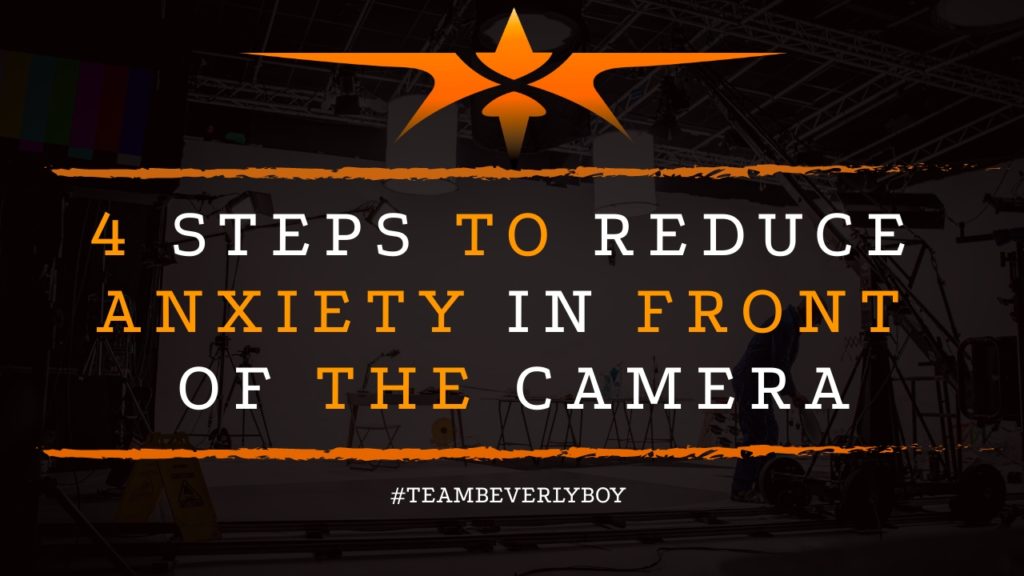
4 Steps to Reduce Anxiety In Front of the Camera
Preparing yourself or your team for their time on camera may be anxiety causing in itself. If you or a team member that is soon to be on camera, feels anxious or otherwise nervous about the upcoming camera event, follow these steps to reduce anxiety and shyness in front of the camera right away. And remember, while there are steps to reduce the anxiety that comes from being in front of the lens, there are also plenty of paid talent options where you can find actors to represent your brand so that you can spend your time focused on other tasks.

#1. Ice Breakers
The first step to reducing shyness in front of the camera is to break the ice with whomever is on the other side of the lens. Just as social interactions are not rushed right away, the same goes for potential talent that is seen in front of the camera.
If you’re in front of the camera for the first time, or you’re filming someone in front of the camera for the first time, use the basic rules of social engagement to break the ice and reduce any camera shyness that may be settling in.
Make sure all members of the camera crew and set crew are properly introduced. Give time for everyone to meet and get to know one another. Ideally, do this before shoot day so that everyone is feeling more relaxed and in tune with their surroundings on the day of the shoot.
While meeting up and getting to know each other won’t prevent camera shyness for everyone, it will certainly help in most cases.

#2. Explain the Process
Fear of the unknown is one of the leading causes of anxiety both in front of the camera and in everyday life. So, to prevent anyone from fearing the next steps or what to expect while production takes place, why not share the process with everyone involved?
Explaining the processes and what to expect will help everyone to feel more comfortable on set and when it’s their time in front of the camera lens.
Let subjects know what they should expect during the production and help them to understand their role. Doing so will give those who have limited background in film a more valuable understanding of why various steps are taken and what options are available to them at each twist or turn.

#3. Mitigate Risks
What can you do to mitigate the risk of someone showing up in front of the camera completely anxious? Minimizing the risk that nervousness will interrupt your shoot day is mostly about talking with people and befriending them on set.
Many are nervous because they fear failure. To reduce camera shyness that results from a fear of failure, minimize the thought of failure by telling the participant what he or she should be doing and what to expect.
Simple knowledge about the scene and steps you are actively taking leading up to the scene can help these individuals feel more at ease.

Say something like:
-Remember, we’re filming which means we can go back. If you feel like you said something wrong or like it’s not the way you want it to sound, we can start over.
-Take as much time as you need. We can wait and we can retake the footage if we need to. There’s really no pressure here to be perfect.
-If you mess up–that’s OKAY! After this is all done, we’ll edit it. Large mistakes, small mistakes–all mistakes are minor when you’re in post production.

#4. Provide Support
Sometimes the simplest gestures make a huge difference in whether someone feels anxious or not both on and off the camera. Offer water, juice, and light snacks so that set members can chat and enjoy a light snack before their role.
If there’s time before the shoot, include scripts in areas nearby that participants can relax and revive if they feel so inclined to do so. The idea here is to help participants to become more acquainted with the script that they will read from soon.
If you’re working with a single individual that will be on camera, consider reducing the camera shyness by chatting with the individual at length before you roll the camera, or roll the camera and capture all of the chatting footage in addition to the scripted recordings.

This is especially true when filming a documentary or really any other content that uses the actual words of the talent on the film. You might be surprised at the content you get when subject’s feel that their content isn’t fully being monitored.
Being in front of the camera doesn’t have to be an anxiety experience. Are you camera shy? Give Beverly Boy Production?
A camera shy individual in front of the camera doesn’t have to be immediately spotted by your audience. call to see what we can do to help you reduce anxiety in front of the camera and generate your content.


